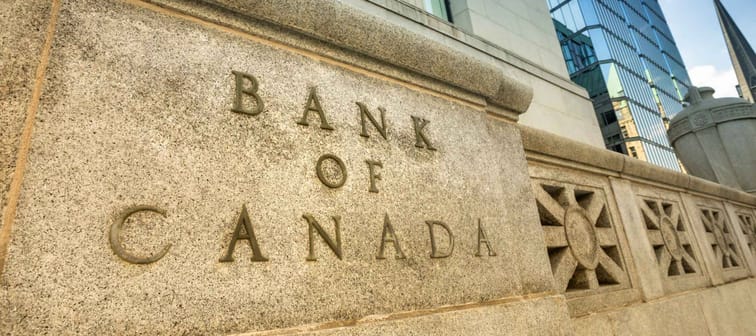Why does the Bank of Canada raise interest rates?
The Bank of Canada plays a very important role in the Canadian economy. It’s in charge of monetary policy, which is no small burden. The bank’s current goal is to keep the inflation rate between one and three percent—a low and stable rate that helps steadily grow our economy and create jobs. An economy that grows too quickly can lead to some of the pain points that many Canadians are experiencing right now: high levels of household debt—currently near a record high—and inflated housing prices—those of you who’ve recently considered buying a home in the GTA just let out a knowing groan, I’m sure.
By raising rates now, our central bank can not only stabilize housing costs and reduce levels of household debt, but can also better protect us from an economic shock in the future (e.g. if the price of oil and gas plummets again or if there’s another global recession). Though those are welcome long-term effects of increased interest rates, the immediate aftermath of the hikes will affect different Canadians in different ways.
In a year of increasing interest rates, your calculator is your friend. See how a 2% increase in rates would affect any of your variable rate debt.
What does an increased interest rate mean for your debts?
It might take you longer to pay off your debt
An increased interest rate by the Bank of Canada will not affect those with fixed rate debts (at least until the terms of said debts come up for renewal). But the rate hike might lead to lenders increasing the prime interest rate that Canadians receive for their loans, which in turn leads to an increase in variable interest rates. Some forms of debt that might have variable rates include:
- Mortgages
- Lines of credit
- Car loans
- Student loans
- Credit cards
Basically, when the Bank of Canada increases its interest rate, consumers with variable-rate loans end up paying more each month. Let’s say you had a variable (also called an ‘adjustable’) rate mortgage in the amount of $400,000 amortized over 25 years. If your mortgage rate is 2.35%, then your monthly mortgage payment would be $1,762. But if the prime rate were to go up by just 0.25% (the amount of a typical interest rate hike), your mortgage rate suddenly hikes to 2.60%, and your monthly mortgage payment goes up to $1,812. It may not look like much, but it definitely adds up over time.
You might have tighter monthly cash flow
If your debt payments increase to cover the elevated interest, you’ll have less wiggle room in other aspects of your budget. In the aforementioned example, you’re paying an extra $50 out of your pocket each and every month over the course of 25 years. That’s a cool $15K when all is said and done. And that’s from only one interest rate hike! Imagine two or three of them in a single year and you get the picture of what this will cost you.
Rate hikes are particularly tough on marginal borrowers: those who barely qualified for a mortgage or loan and who borrowed at the maximum (or near maximum) interest rate they were approved for. Though I generally support and encourage Canadians who are aggressive in their pursuit of homeownership, the repeat rate hikes we’re seeing should make would-be marginal borrowers think twice before signing on the dotted line, as they might now have a tough time refinancing their debt.
How to protect yourself from rising interest rates
The threat of rising interest rates isn’t fun if you’re carrying debt tied to prime, so here’s how to hold on to more of your money in this period:
Prioritize paying down any variable rate debt
If you have both fixed rate debt and variable rate debt (tied to prime), consider making a plan to aggressively pay down your variable rate debt first. By paying down this debt more quickly, you can soften the impact of higher interest rates and pay less over time. Caveat: if you have substantial fixed debt, such as high-interest credit card debt, it might still make sense to focus on paying that down first, depending on how much fixed rate debt you have and how high the fixed rate is.
Consider converting to fixed rates
If the possibility of ever-increasing interest rates keeps you up at night, and you’re currently in the market for a loan, consider choosing loans that are tied to a fixed rather than variable rate. If you already have a variable rate mortgage or home equity line of credit, check with your lender to see if they’ll let you convert to the stability of a fixed rate. Just keep in mind that you’ll probably get something called the “conversion rate,” which will be higher than the fixed rate given to brand new customers of that lender. Take the conversion rate that they offer you, do some number crunching, and compare the amount you’ll end up paying with the conversion rate to what you’d pay with your current variable rate. Then factor in the possibility that the Bank of Canada increases interest rates by 0.5% later this year.
Similarly, if you have a variable rate credit card, now might be the time to cancel it and seek out a low-interest fixed-rate card that won’t be tied to prime.
Stress test your own finances
In a year of increasing interest rates, your calculator is your friend. See how a 2% increase in rates would affect any of your variable rate debt. Although you’re only technically required to do a mortgage stress test when you first qualify for a mortgage, it’s still a good exercise to make sure you aren’t going to run into any cash flow problems later on if and when higher rates do arrive.
Keep an eye on the news
If the U.S. decides to pull out of NAFTA, the Bank of Canada could put the brakes on any further plans for rate hikes until talks resume. Some of what ‘the Donald’ says may just be hot air, but if he does follow through, those with debt tied to prime will be able to rest a little easier.
This post was not sponsored. The views and opinions expressed in this review are purely my own.







